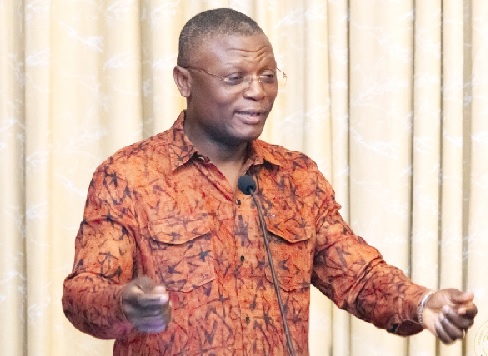
Project 2042: Can Ghana rally West Africa for mega FIFA World Cup bid?
he Minister of Sports and Recreation, Kofi Adams, has breathed fresh life into a bold and long-running national ambition: Ghana leading a sub-regional bid to host the FIFA World Cup alongside Nigeria and Côte d’Ivoire.
His remarks, delivered with striking confidence, reignited an idea once dismissed as fanciful but now increasingly aligned with FIFA’s evolving approach to staging football’s biggest showpiece.
With the world governing body shifting decisively towards multi-nation hosting due to the enormous financial and infrastructural demands of modern tournaments, Mr Adams believes Ghana’s moment to anchor a West African World Cup bid may finally be within reach.
“FIFA are beginning to adopt a number of nations doing it, so maybe who knows? The next one could be Ghana, Nigeria and Côte d’Ivoire coming together to host the World Cup, and it will be good,” he said after inaugurating the ministerial technical committee for the 2026 World Cup.
“I believe that we, together with Nigeria and Côte d’Ivoire, who have already invested quite a lot because they hosted AFCON not too long ago, can do this.”
The minister’s comments come against the backdrop of Ghana’s upcoming participation in the 2026 tournament, jointly hosted by the United States, Mexico and Canada, and FIFA’s decision to award the 2030 World Cup to a tri-continental partnership involving Spain, Portugal and Morocco. The message is unmistakable: single-nation hosting is fast becoming a relic of the past.
Dream reawakened
Mr Adams has inadvertently opened the pages of history, taking the nation back to 1999 when Ghana spearheaded an audacious Pan-African plan to bid for the 2006 World Cup.
That proposal—Project 2006—brought together Ghana, Nigeria, Côte d’Ivoire, Egypt, Morocco and South Africa in an unprecedented five-nation campaign to get the World Cup to African soil for the first time.
Then-GFA President Alhaji M.N.D. Jawula, buoyed by CAF’s last-minute decision to award the 2000 AFCON to Ghana and Nigeria—the first co-hosted major football tournament in history—told Reuters in a 1999 interview that Ghana lacked the standalone capacity, financially and organisationally, to host a World Cup alone.
A shared continental bid, he argued, was Africa’s best shot, even if critics branded it unrealistic.
Now, more than two decades on, the architect of Project 2006, Magnus Naabe RexDanquah, insists the vision deserves serious reconsideration.
Speaking to Daily Graphic, he said the minister’s renewed call fits perfectly into FIFA’s current pattern of spreading the event across multiple borders to dilute cost pressures and maximise global reach.
With Morocco set to co-host the 2030 tournament alongside Spain and Portugal— and ceremonial matches to be staged in Uruguay, Argentina and Paraguay —FIFA’s appetite for cross-continental hosting has never been clearer.
For the first time in World Cup history, the opening matches will be played on a different continent from the main host nations, underscoring the organisation’s willingness to rewrite tradition.
For Mr RexDanquah, this presents a moment Ghana cannot afford to ignore. He believes a four-nation West African bid for the 2042 World Cup would not only be feasible but transformational.
“We must begin to dream again and achieve the impossible,” he urged.
Learning curve and financial reality
If the continent has learnt anything from past attempts, it is that ambition must be matched by strategy.
Morocco has the unenviable record of the most unsuccessful World Cup bids, falling short in 1994, 1998 and 2010, despite credible campaigns. It was South Africa who eventually delivered Africa’s first World Cup in 2010.
These lessons highlight both the opportunity and the competitive intensity of World Cup hosting.
A Ghana-led sub-regional bid would face two major financial barriers long before a ball is kicked: the cost of bidding and the cost of hosting.
A World Cup bid alone can cost between $16 million and $24 million, while Olympic bid campaigns range from $28 million to $49 million. Pre-bid feasibility studies, lobbying efforts and infrastructure assessments add millions more.
Such an undertaking would demand unwavering government backing, a united business community, and strong parliamentary consensus.
Ghana’s recent experiences, particularly the legacy issues following the 2008 AFCON and the 13th African Games (Accra 2023), serve as reminders that infrastructure without long-term planning can become a financial burden rather than a national asset.
Catalyst for economic transformation
Yet, the economic incentives remain compelling. A successful multi-nation World Cup bid would trigger major investments across West Africa, including:
• state-of-the-art stadiums and training pitches
• expanded and modernised transport networks, including rail
• hospitality upgrades across tourism hotspots
• digital, security and event-management technologies
• urban regeneration projects with long-term impact
The World Cup is widely regarded as a catalyst for socio-economic transformation— driving tourism, stimulating job creation, enhancing national branding and repositioning host countries as attractive investment destinations.
Verdict
With FIFA openly embracing multi-nation formats and Africa set to feature prominently in future hosting cycles, Ghana’s aspiration to lead a sub-regional World Cup bid is no longer the far-fetched idea it once seemed.
The feasibility hinges on bold political vision, meticulous financial planning, and strategic collaboration across West Africa.
If executed well, a Ghana-led bid could unlock a generational opportunity to reshape the region’s sporting, economic and infrastructural landscape.
